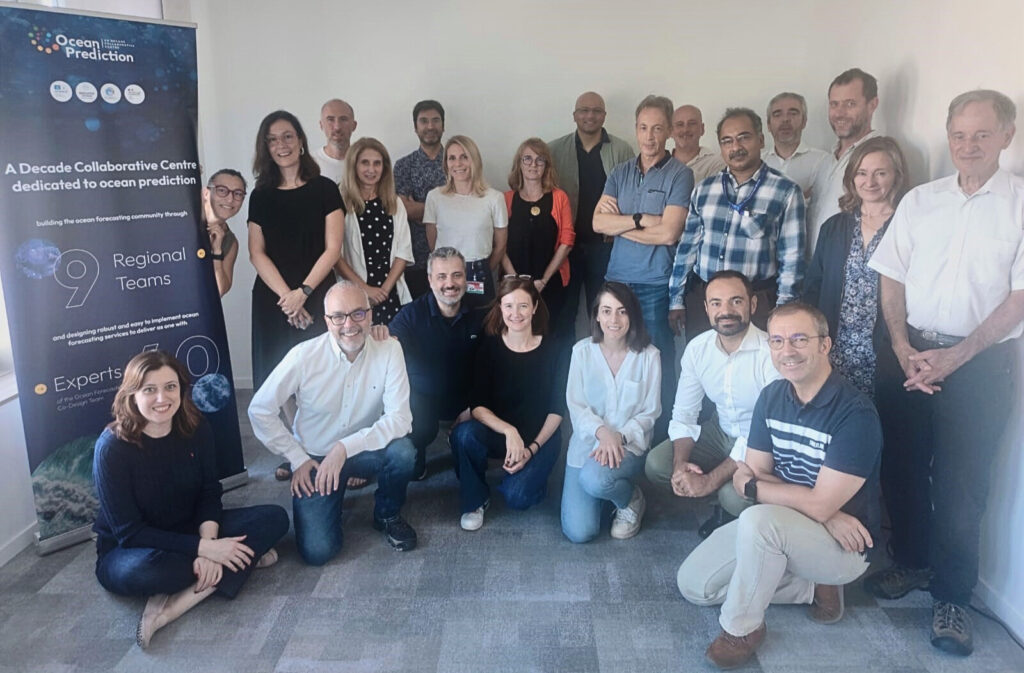Harmonizing Ocean Forecasting: Global Integration Efforts within OceanPrediction

Co-Designing Ocean Forecasting: Bridging Global Expertise
The Ocean Forecasting Co-Design Team (OFCT) is a pivotal element of the OceanPrediction Decade Collaborative Centre (OceanPrediction DCC) and the group recently gathered for a two-day meeting, the 27 to 28 September 2023, at Mercator Ocean International's (MOi) headquarters in Toulouse. They worked to collaboratively design an integrated ocean forecasting architecture, with the goal of transforming isolated services into a coordinated global effort. As an integral component of OceanPrediction, the OFCT, consisting of global specialists, utilizes the digital twinning concept to develop standardized tools and practices, placing a strong emphasis on collaboration with Regional Teams to seamlessly integrate global and regional efforts for the advancement of ocean forecasting capabilities.
At this recent meeting in Toulouse, the OFCT explored tools and standards across the forecasting value chain. The OFCT's outcomes, including three distinct forecasting architectures, and hold the promise of substantial improvements, which will benefit industries and communities worldwide.
The Ocean Forecasting Co-Design Team's Mission
Introduced as a steering asset of the OceanPrediction, the Ocean Forecasting Co-Design Team (OFCT) is a crucial component of the recently launched OceanPrediction Decade Collaborative Centre (DCC). The OFCT is comprised of global specialists covering the entire ocean forecasting value chain and is dedicated to designing an integrated ocean forecasting architecture. Leveraging the digital twinning concept for a simpler, modular, and more robust development of systems, the OFCT focuses on building well-defined building blocks such as standards, tools, best practices. This includes the development of two key documents: 1) the Operational Readiness Level (ORL) scoring system; and the 2) the Architecture of Ocean Forecasting Guide.
The ORL serves as a tool for system developers to assess the operational status of a system. Improving the ORL qualification of a service is a means to implement best practices in ocean forecasting, enhancing the overall operability of the system. It is composed of three independent digits designed to indicate the operational status of an Ocean Forecasting System.
In today's context, Operational Ocean Forecasting Systems (OOFS) are highly valuable, and there are a wide range of successful implementations within the marine community. However, technical disconnection among services poses challenges:
- Limited Interoperability: Core services lack sufficient connectivity, impeding seamless collaboration.
- Documentation and Tools Gap: The absence of endorsed documentation and tools complicates extending OOFS to developing countries, hindering community growth and knowledge enrichment.
- Complex Operation: Operating OOFS lacks clear best practices, especially when expanding to diverse landscapes like developing countries.
- Isolated Development: OOFS often end up as isolated services, limiting collaborative opportunities and knowledge exchange.
Addressing these issues is crucial for a more cohesive and expansive future for OOFS. To address redundancy and uncertainties in existing services, OceanPrediction DCC, aligned with the Ocean Decade and digital twinning concept, aims for a breakthrough. The Ocean Forecasting Co-Design Team, composed of global experts, have crafted the Architecture of Ocean Forecasting Guide that will be released in the coming months. It has two key objectives:
- Overcoming Limitations: Inspiring Decade Actions related to ocean forecasting, fostering collaborative developments, and enhancing interoperability within the community.
- Basis for Capacity Development: Serving as a foundation for future capacity development activities, complementing the ETOOFS Guide (Alvarez-Fanjul et al., 2022).
Emphasizing collaboration, the OFCT closely aligns its work with the Regional Teams, ensuring a seamless integration of global and regional efforts for advancing ocean forecasting capabilities.

Follow us